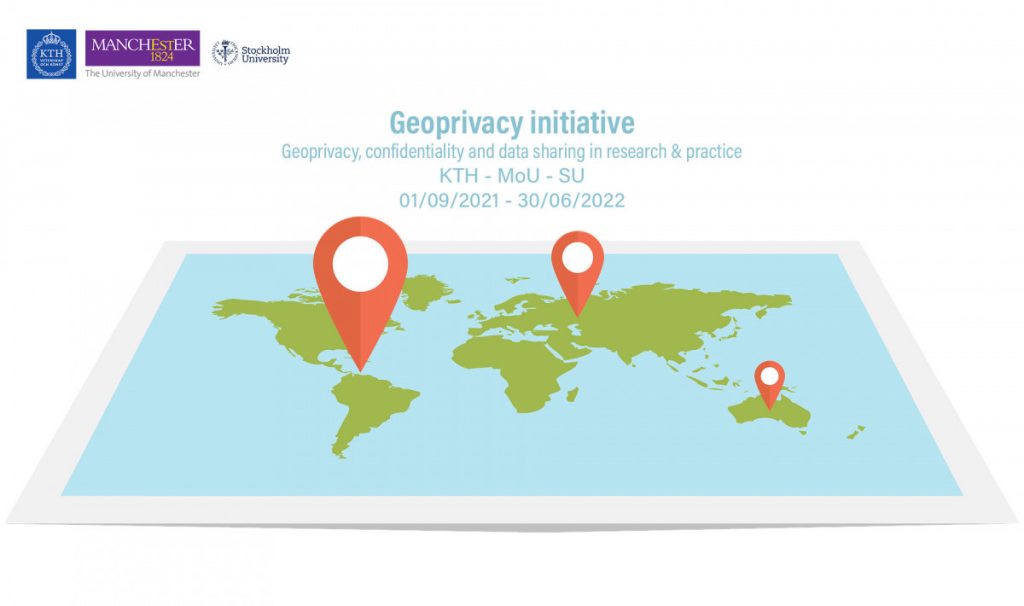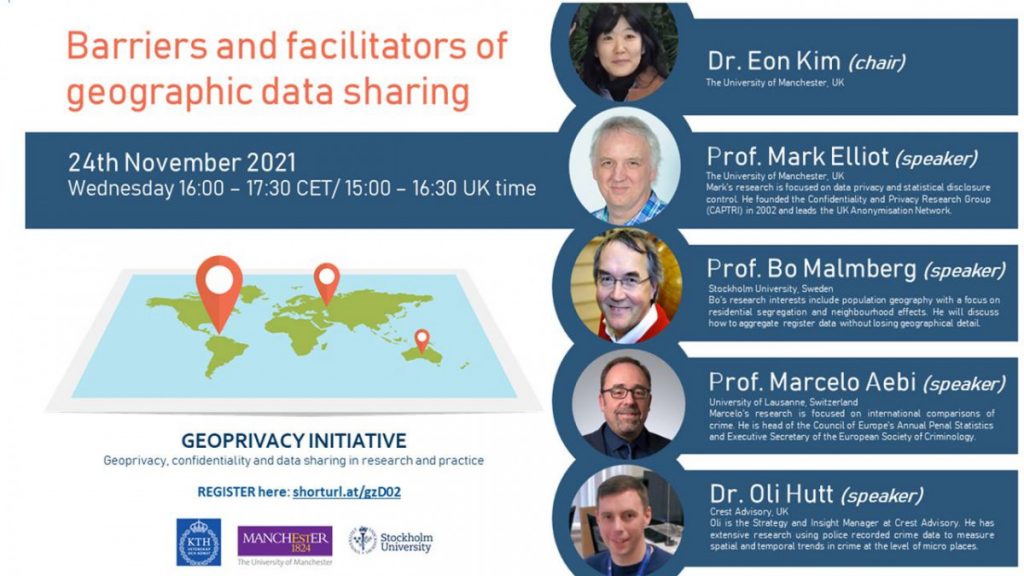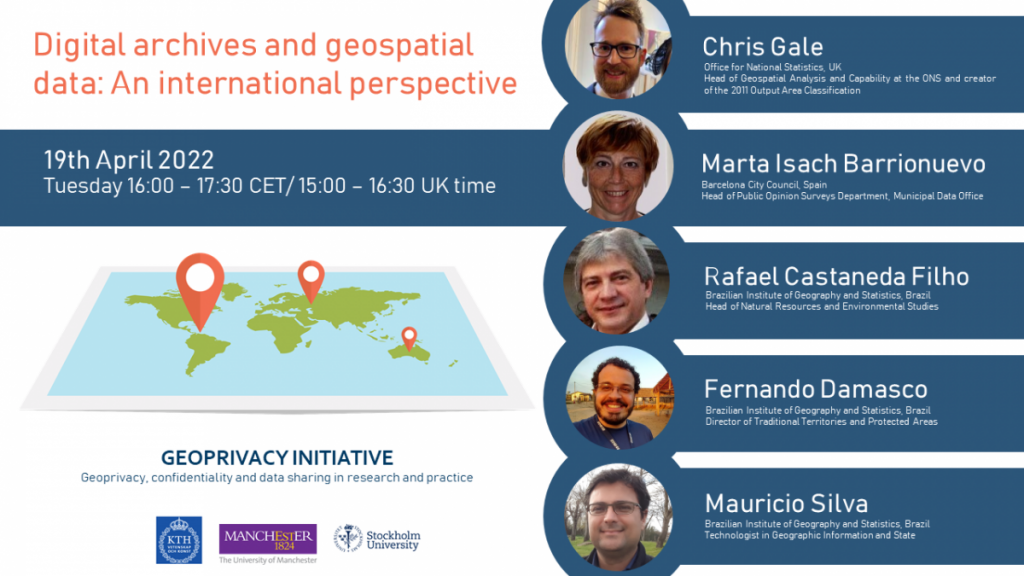Geointegritetsinitiativ
Webinars: Geointegritetsinitiativ

Motivation and Aim
Research and practice have become increasingly reliant on geodata. This development creates demand for new privacy-preserving ways of data sharing and storage. The characteristics of georeferenced data present unique challenges for digital security and privacy.
The aim of Geoprivacy initiative is to create arenas of discussion about the obstacles and methods for data storage and sharing in order to support a growing geospatial interdisciplinary community of researchers; tight linked to society’s demands. The intention is to promote new collaborations and in the longer term, to build international teams dedicated to research reproducibility and data sharing in line with the UN’s 2030 Sustainable Development Goals.
Our interdisciplinary team is composed of many disciplines across the three universities (Geography, Criminology, Urban Planning, Economics, Ethics and Philosophy, Data Science and Engineering) in collaboration with practitioners. We draw on our experience and expertise in these areas to discuss challenges of geodata privacy and explore areas for future work on identifying sustainable practice.
On 20 October 2021
The first meeting is devoted to brainstorming and mapping out the current state of issues of geoprivacy, confidentiality and data sharing and storage in Sweden, UK and elsewhere. Due to predictable spatial patterns of behaviour, geodata can be highly identifiable, even when care is taken to anonymize. Guidance under GDPR, data ethics guidance, and codes of conduct of data users provide solutions (e.g. safe data enclaves and protocols, passports) are not without their issues, and the unique challenges for geodata are a relatively unexplored territory.
Each workshop will lead to a short written output available in a joint website of this collaborative network, and informal outputs such as blogs, feeds in social media and the similar. When relevant, our students in Stockholm and in Manchester will take part in these activities.
Our future collaboration will be primarily based on a series on meetings (3-4 webinars) and a colloquium in Stockholm hosted by KTH and SU, late Spring 2022, starting 20th October 2021 and ending 30th June 2022. Extra activities including a training webinar for PhD students/practitioners and early career researchers about geodata privacy are also part of our collaborative agenda.

Webinars Series:
1. Why geoprivacy matters? An international perspective – 20 october 2021 / KICK-OFF event!
Recent advances and widespread use of a wide range of geospatial technologies (e.g., GPS-equipped mobile phones and sensors) in people’s daily life have ushered in the era of geospatial big data. With the help of these location-aware technologies, enormous amounts of personal location data can be collected without the notice of data contributors. However, because of the precise locations they contain, these data have considerable potential for disclosing people’s identity through a process known as spatial reverse engineering. Personal privacy is thus a significant concern in the era of geospatial big data. Data contributors are at the risk of being identified and having their personal privacy violated if their data are not handled properly. In this presentation, I will discuss why geoprivacy matters and how geoprivacy issues may be addressed based on my work on geoprivacy protection (e.g.. geomasking methods and the geospatial virtual data enclave [GVDE] that seek to enable the sharing of geospatial data while protecting individual geoprivacy and data confidentiality). The opportunities and challenges of data sharing from pubic organizations to academia will be discussed. Drawing upon my study on COVID-19 control measures in 3 countries, I will highlights the factors that affect people’s geoprivacy concerns for and acceptance of these measures and what COVID-19 control measures are likely to be effective based on people’s acceptance of these measures.
Kwan offered a broad, international perspective in why geoprivacy matters, describing how scientific research relies on the sharing of data to generate replicable results, yet such data needs to be negotiated within the context of risk and privacy. This means data management policies are needed which recognise perceived risks to individuals who may be supplying sensitive or trackable information. Her talk questioned how organisations can maintain confidentiality whilst still sharing data which can be socially beneficial. Personal privacy is particularly an issue in the context of COVID-19, where countries have used location data in governmental responses. Kwan discussed how such geoprivacy issues can be addressed using methods such as geomasking, as well as highlighting the potential opportunities for the current rise in access to geospatial data. Questions to Kwan centred around issues of transparency, public trust, and risk management.
2. Barriers and facilitators of data sharing on 24 november 2021
This seminar will bring together world-leading experts in data privacy, population geography, and criminology to discuss the main barriers and facilitators for geographic data sharing, including issues around data confidentiality and the need for Statistical Disclosure Control assessments, the selection of adequate levels of geographic aggregation, and practicalities around access to data and data management.
This seminar was a part of the Geoprivacy initiative, a collaborative project between the University of Manchester, KTH Royal Institute of Technology, and the Stockholm University.
The speakers
Prof. Mark Elliot (University of Manchester, UK) – Mark’s research is focused on data privacy and statistical disclosure control. He founded the Confidentiality and Privacy Research Group (CAPRI) in 2002 and leads the UK Anonymisation Network.
Prof. Bo Malmberg (Stockholm University, Sweden) – Bo’s research interests include population geography with a focus on residential segregation and neighborhood effects. He will discuss how to aggregate register data without losing geographical detail.
Prof. Marcelo Aebi (University of Lausanne, Switzerland) – Marcelo’s research is focused on international comparisons of crime. He is head of the Council of Europe’s Annual Penal Statistics and Executive Secretary of the European Society of Criminology.
PROJECT – https://wp.unil.ch/space
Dr. Oli Hutt (Crest Advisory, UK) – Oli is the Strategy and Insight Manager at Crest Advisory. He has extensive research using police recorded crime data to measure spatial and temporal trends in crime at the level of micro places. Oli managed a secure data research facility at University College London – the first of its kind in Europe.
The seminar will be chaired by Dr. Eon Kim from the University of Manchester, UK.
Common question themes included how to develop a consensus in defining concepts such as neighbourhoods, reasonable risk, and privacy. As well as how to produce comparative statistics which have countries using similar units of analysis and scale.
Prof. Mark Elliot: Understanding Anonymisation
Anonymisation is a process where person data is rendered non-personal in order to make it difficult to re-identify individuals. Mark’s talk identified challenges in anonymisation such as the impossibility of zero in risk in privacy terms, the difficulties in quantifying the impact of a confidentiality breach, and the disproportionate responses to confidentiality including immediately sharing data to avoid a breach or being hyper-cautious and refusing to share any data at all. Anonymisation represents a risk-managing process, which Mark contextualised by describing the role of geographical data in risk assessment and control.
Prof. Bo Malmberg: Aggregating Geocoded Register Data Without Losing Geographical Detail
Bo discussed the challenges in aggregating individual-level registered data in Sweden, highlighting how to negotiate between making an interesting and useful map without losing geographical detail and ensuring privacy. His solution revolved around expanding a buffer around specific locations to make individualised neighbourhoods, and then aggregating the statistics contained in such buffer. Bo considered the importance of scale in geographic and comparative studies which identify patterns in spatial data.
Prof. Marcelo Aebi: Council of Europe Annual Penal Statistics (SPACE)
Marcelo looked at two large data sets – SPACE, and the European Sourcebook of Crime and Criminal Justice Statistics – to emphasise the challenges in comparing data when such datasets use different definitions of concepts. Connecting European countries and maintaining a level of transparency in data publication is important, however, there is a lack of consensus in privacy policies across Europe which makes such a task difficult.
Dr. Oli Hutt 2022: Experiences of Getting (Geo)Data from Police Forces
Oli’s anecdotal talk described the difficulties in obtaining data from the Police where there is a plethora of gatekeepers restricting access. Organisations need be assured of what their data will be used for, how it will benefit them, and that data protection policy will be followed. This requires good working relationships with people throughout the chain of command.
3. Challenges to using and sharing confidential Geospatial data on 11 February 2022
This seminar will bring together world-leading experts in GIS and Geography, Information Technology and Law, and Research Data Management to discuss the key challenges to using and sharing confidential geospatial data.
This seminar is part of the Geoprivacy initiative, a collaborative project between the University of Manchester, KTH Royal Institute of Technology in Stockholm, and Stockholm University.
The speakers
Prof. Doug Richardson (Harvard University, USA). Doug is a distinguished researcher at Harvard University and executive director emeritus of the Association of American Geographers. Prior to joining the AAG.
Rosa Lönneborg (KTH Royal Institute of Technology, Sweden). Rosa is a Research Data Coordinator at KTH Royal Institute of Technology.
Dr. Catherine Easton (Lancaster University Law School, UK). Catherine is a reader of Information Technology and Intellectual Property Law.
Common themes included how to analyse and compare large data sets from different disciplines as well as how to deal with competing obligations and access criteria from a multitude of stakeholders.
Dr. Rosa Lönneborg: The Balance Between Privacy and Open Data
Rosa considered the legal data issues arising in research, particularly the challenges in balancing privacy and openness when multiple stakeholders are involved in a complex legal and ethical landscape. Her talk focused on facilitating data sharing through Swedish stakeholder mapping.
Dr. Catherine Easton: Cross-Border Data Sharing in Emergencies
Catherine discussed how to prepare datasets to be accessible from a legal and ethical perspective when in the context of data sharing across border in emergency situations. She focused on how data can be made usable in both prevention and post-disaster responses, particularly when considering climate change. Key focus was on developing technology which can be usable by the general public.
Prof. Douglas Richardson: Addressing Confidential Geospatial Data and Geoprivacy
There is a tension in science between confidentiality and transparency. Douglas examined the challenges in visualising geospatial data which could lead to identification of individuals. He described how the Geospatial Virtual Data Enclave (GVDE) represents an integrated approach for accessing, sharing, and building on research involved in confidential geospatial data.
4. Digital archives and geospatial data: An international perspective on 19 April 2022
Chris Gale (Office for National Statistics, UK)
Marta Isach Barrionuevo (Barcelona City Council, Spain)
Rafael Castaneda Filho (Brazilian Institute of Geography and Statistics, Brazil)
Fernando Damasco (Brazilian Institute of Geography and Statistics, Brazil)
Mauricio Silva (Brazilian Institute of Geography and Statistics, Brazil)
Common themes and questions included how to ensure confidentiality using different units of analysis and scale. This reflected on issues of who is included and excluded when grouping data, as well as how this affects the narrative being told.
Rafael March, Fernando Damasco, Mauricio Silva: Data Sharing and Geoprivacy Routines in Brazil
This talk identified when confidentially in mapping data is needed, including risks to revealing the identity and position of certain indigenous communities as well as other minority groups. The speakers emphasised the role of minimum geographic unites in ensuring individual’s safety, where units are aggregated by census tracts and must contain at least 5 households
Chris Gale: Geospatial Ethics for Statistics
Chris discussed how a good culture of ethics is promoted in statistical organisations which does not take for granted confidentiality, inclusivity, or the danger of bias and discrimination. He described the ethical responsibilities of statistics, including public trust and accountability, as well as the challenges in delivering this, such as competing stakeholder obligations. Researchers must be careful not to adhere to a certain narrative, and instead let the data speak for itself and produce reliable, accurate statistics than generate policy which positively impacts people’s lives.
Marta Isach Barrionuevo: Digital Archives and Geospatial Data Seminar – Barcelona City Council
Marta traced the history of the Barcelona statistics department in order to emphasise the importance of an efficient data management model which unites departments under a shared strategic vision of data dissemination. Her demonstration of the interactive municipal service survey highlighted the need for an effective delivery of geospatial data which simultaneously protects personal information whist transparently administrating social, economic and demographic data.
5. Geoprivacy & data security in practice Workshop for masters and PhD students on 23 May 2022
A ‘hands-on workshop’ organized by researchers from Manchester university, in the UK, Stockholm University, and KTH Royal Institute of Technology, Sweden.
Speakers:
Dr. Reka Solymosi, University of Manchester, UK
Dr. Ulf Jansson, Stockholm University, Sweden
Dr. Eon Kim, University of Manchester, UK
David Buil Gil, University of Manchester, UK
Prof. Vania Ceccato, KTH Royal Institute of Technology, Sweden







